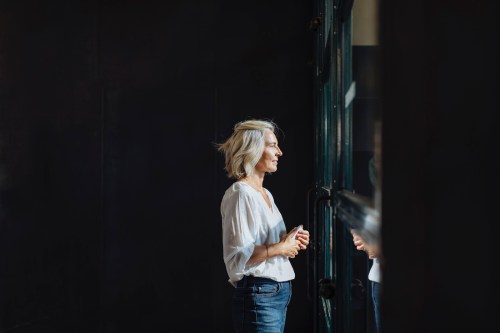No matter how hard we strive to be fair and good, the human brain holds a network of problematic biases. One that can get often overlooked? Ageism. According to research from the University of Michigan, more than 82 percent of people aged 50 to 80 experience one or more forms of ageism in their everyday lives. Such ageism against the elderly (or slightly below that senior discount cut-off) needs to be reprogrammed.
Experts in This Article
clinical psychologist, life fulfillment expert, and author of Date Smart, Joy From Fear, and Aging Joyfully
Not only is ageism a cruelty that we put on others, but it’s a cruelty we put on ourselves. While 65 percent of participants in the study reported exposure to ageist messages, 36 reported internalized ageism. And the things is, we’re socialized to perceive younger as better way, way, way before we hit the middle age.
In her book Aging Joyfully, clinical psychologist Carla Marie Manly, PhD, addresses how ageism begins to affect us early in life —often impacting our self-esteem and anxiety as early as our 20s. “I’ve so many millennial clients who fear that they are ‘old’ or ‘no longer relevant when they are in their late 20s or early 30s,” says Dr. Manly. “And, with each passing year, it tends to worsen given the youth-oriented energy of our society.”
Lest we forget, too, if you’re socialized a woman, society tends to put you out to pasture way before the so-called perennial silver foxes of the world. And that goes beyond pop culture cliches like older men dating almost-teenagers—ageism is the top aspect that impacts women in the workforce, according to a 2019 study published by The Riveter. Women over the age of 40 face serious discrimination when it comes to hiring even when for entry-level roles.
Ageism is a whole systematic mess of an issue, but that doesn’t mean we can’t all try to be less ageist on a personal level. In fact, the journey starts with being simple aware of our internal mindset regarding age.
“This involves striving to be consciously attuned to any internal dialogue, often driven by external forces, that says, ‘Younger is better, younger is more attractive,'” says Dr. Manly. “When we become mindful of this often-unconscious internal tape, we can then strive to adjust to create a more positive mindset and positive behavioral shifts.”
In order to not be so ageist towards other people, then, we need to kind of retrain our brain to believe old isn’t a nightmare. And no matter what age you are, that journey is probably going to begin with your own personal perception of aging.
“We ‘unlearn’ best when we become conscious of what is unhealthy and then work to replace the unhealthy thought or behavior with a positive thought or behavior,” she says. “For example, if a person thinks, ‘I’m getting too old,’ the positive shift would be, ‘I am gaining so much life experience; I’ll continue to learn and grow so that I can be an asset to whatever field I am in.'”
Another mindset shift might come when you stumble upon an Instagram photo of a young, sleek, untouched-by-time but maybe-touched-by-FaceTune woman. Suddenly you feel “past your prime,” as if we have an expiration date besides literal death. ‘The shift would be to not focus on such images in the future and, instead, focus on images that are affirming and positive—those that don’t induce a sense of self-comparison,” says Dr. Manly. “With practice, ageist micro-aggressions tend to fade away, yet we must be vigilant given the youth-focused nature of today’s world.”
Sign Up for Our Daily Newsletter
Get all the latest in wellness, trends, food, fitness, beauty, and more delivered right to your inbox.
Got it, you've been added to our email list.











